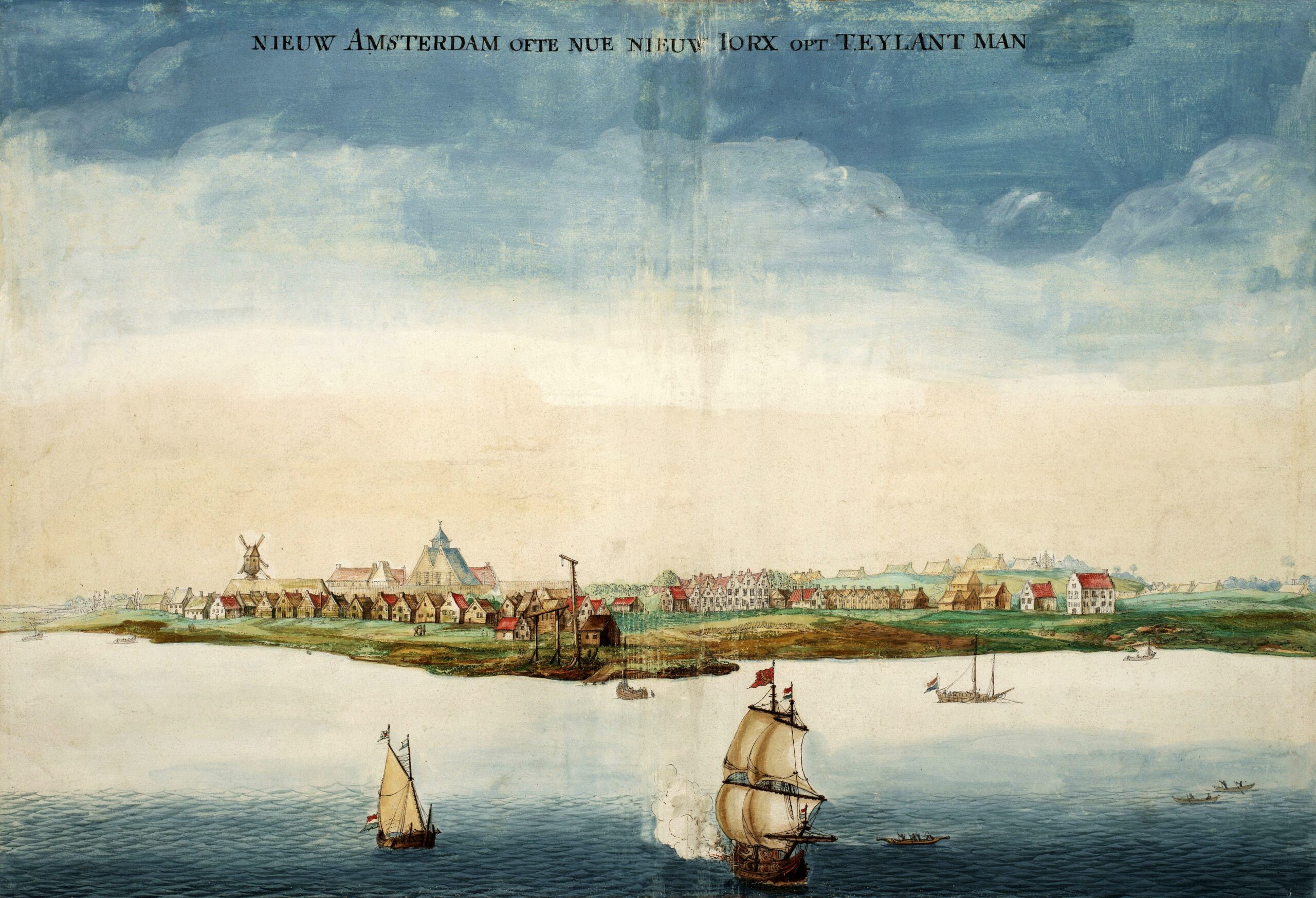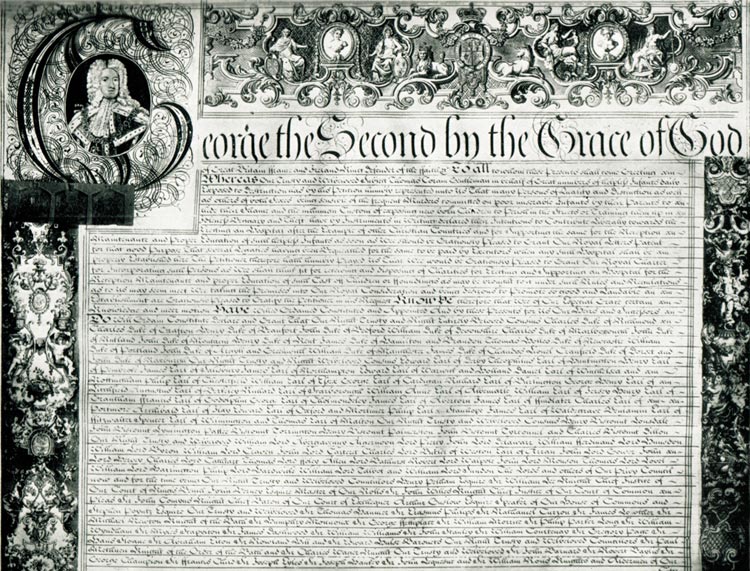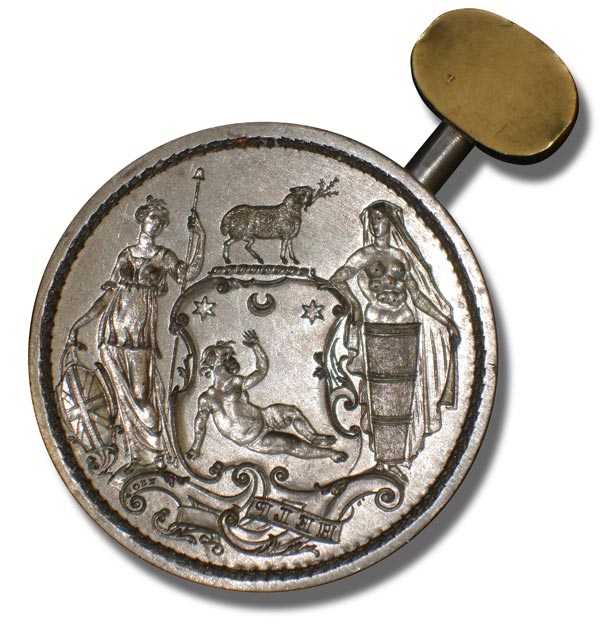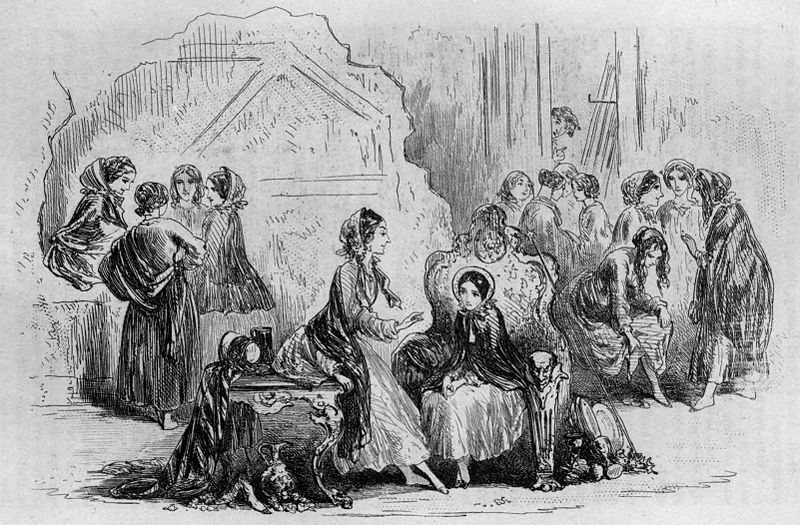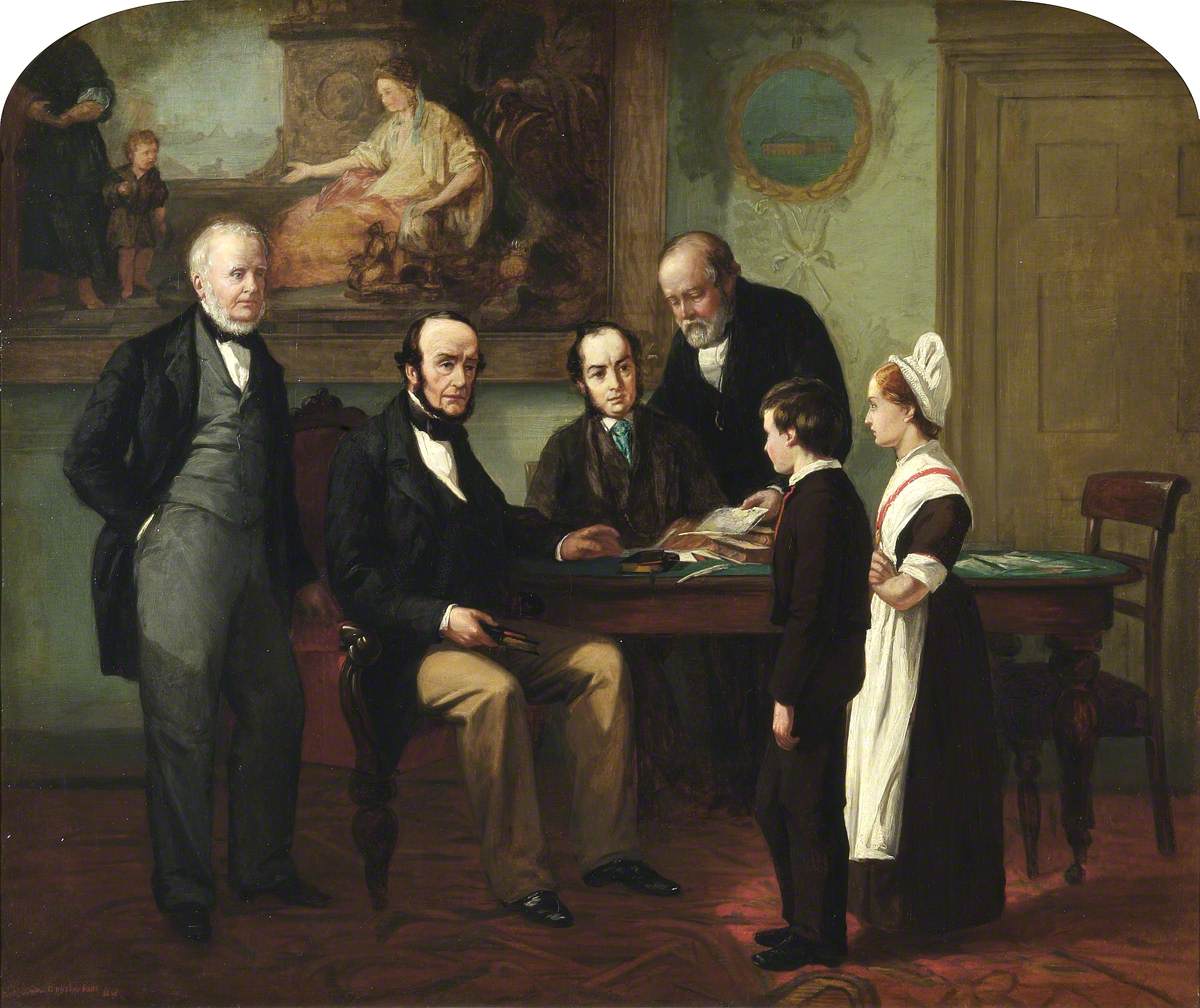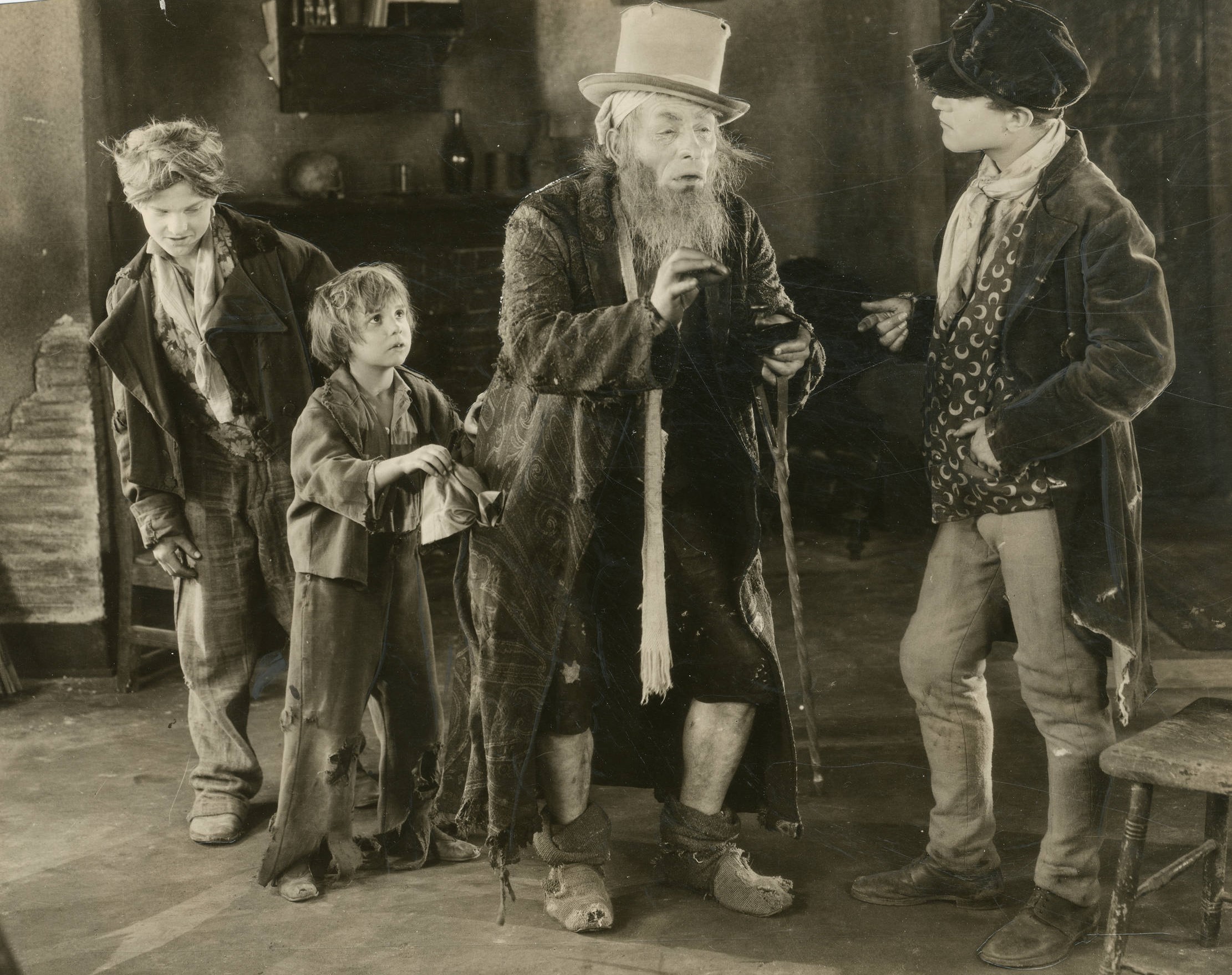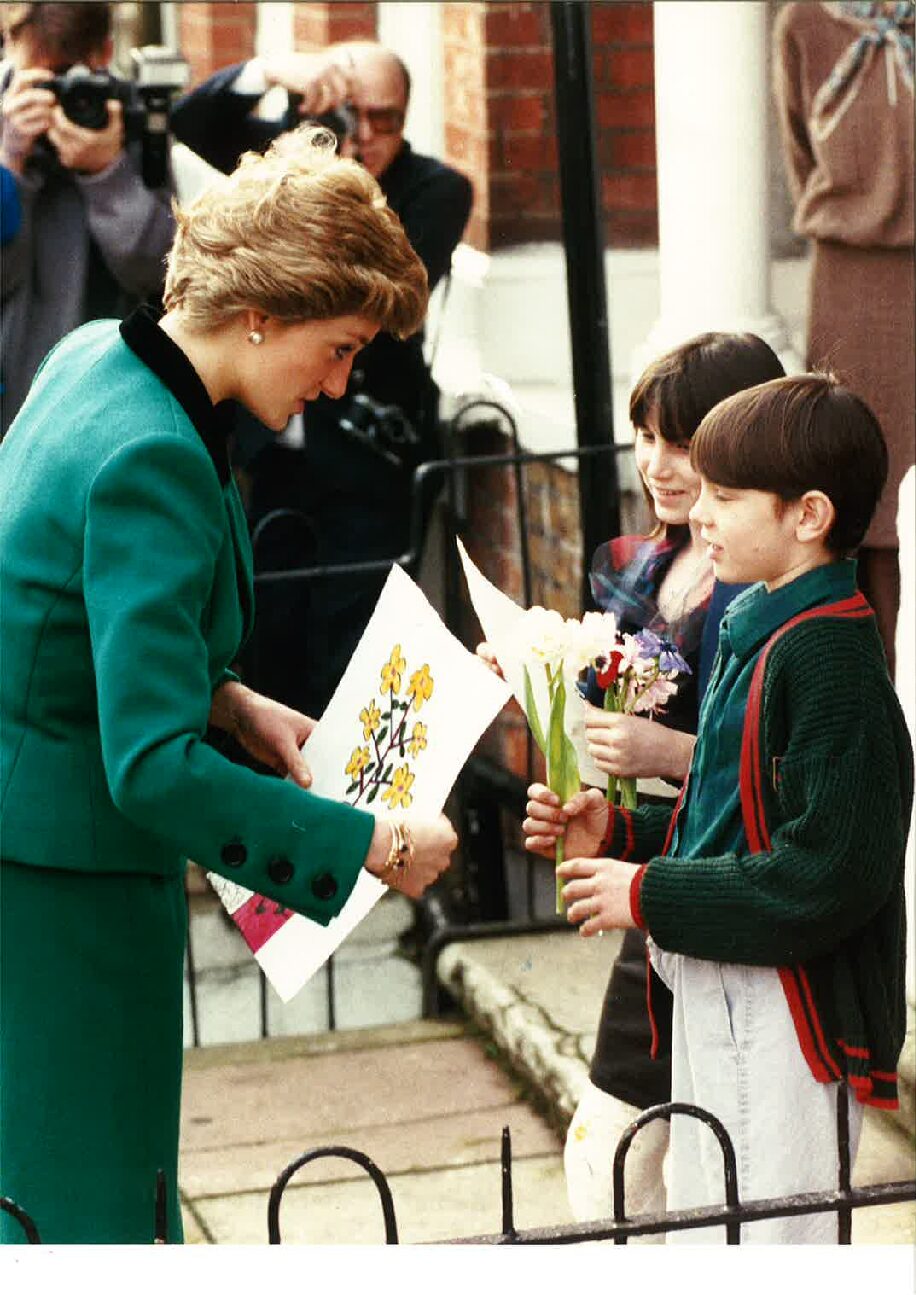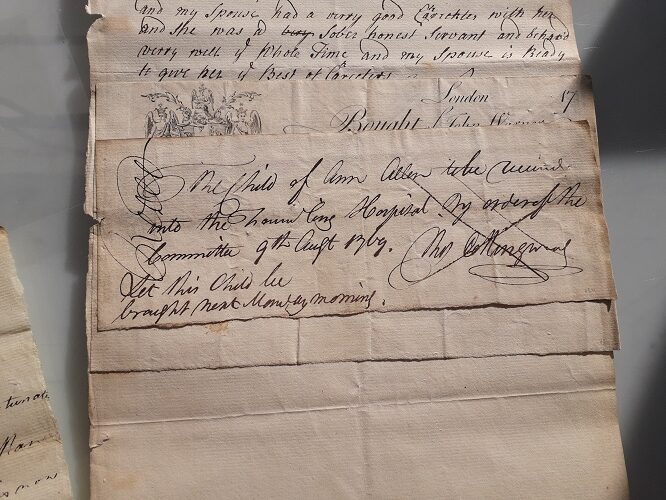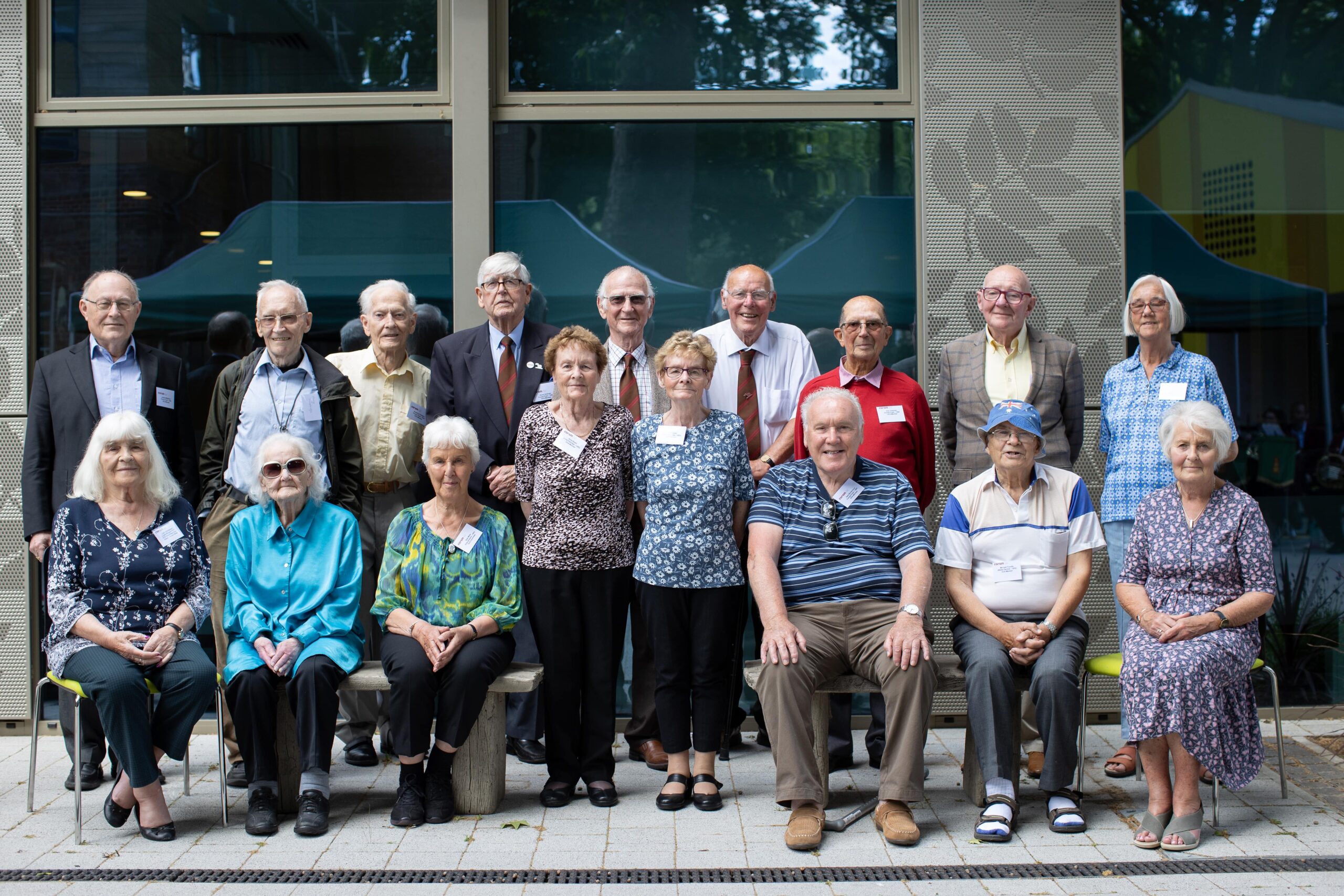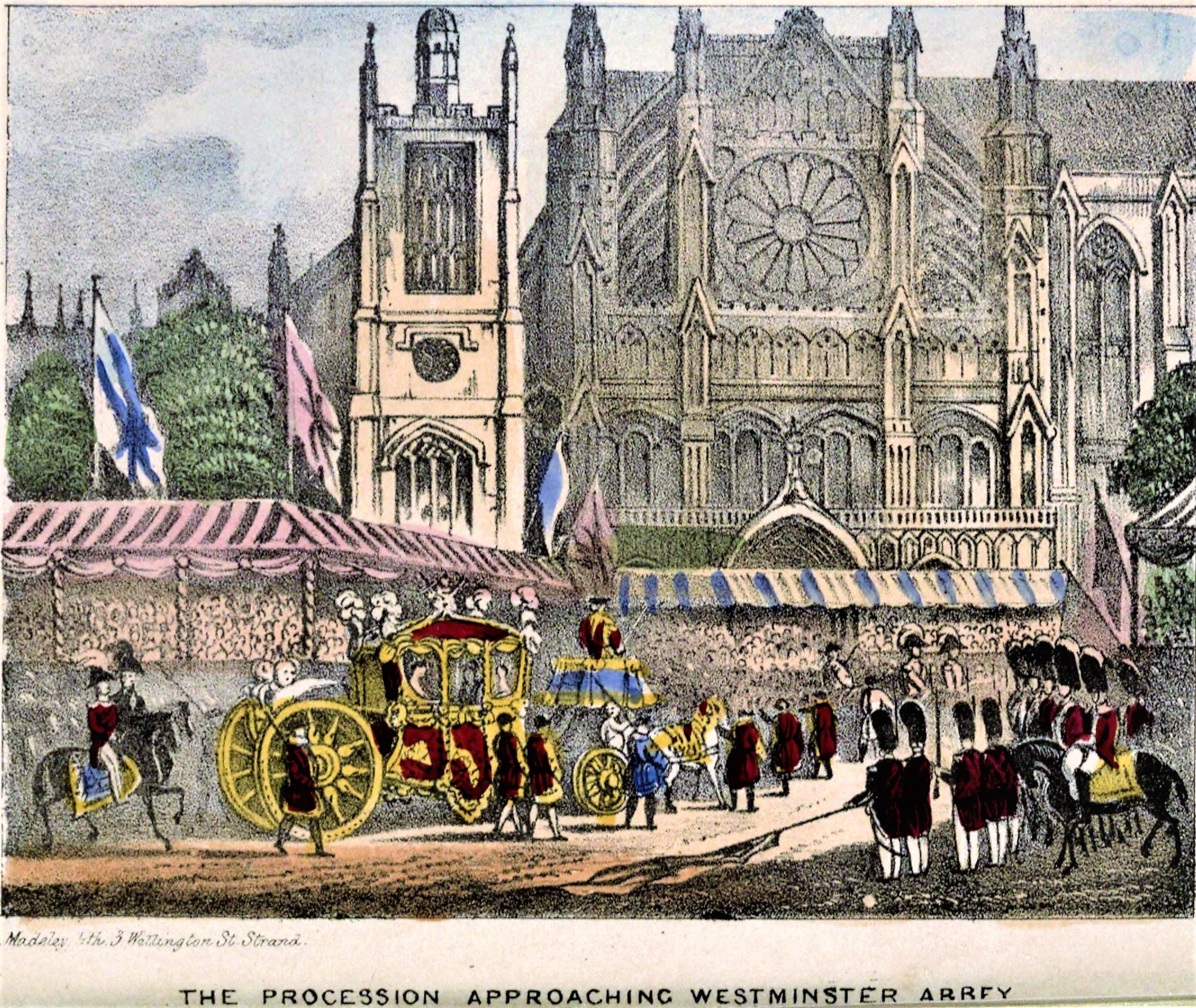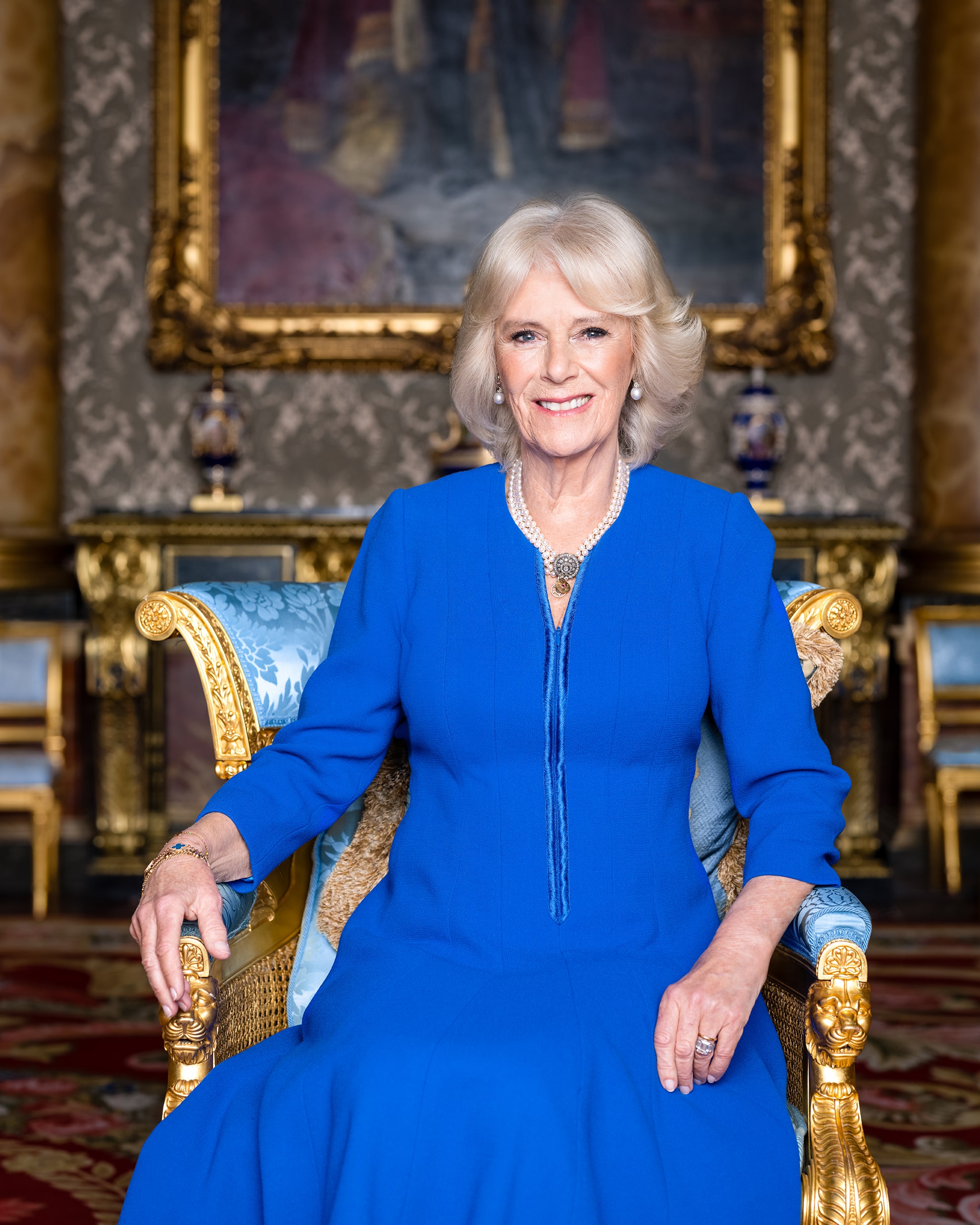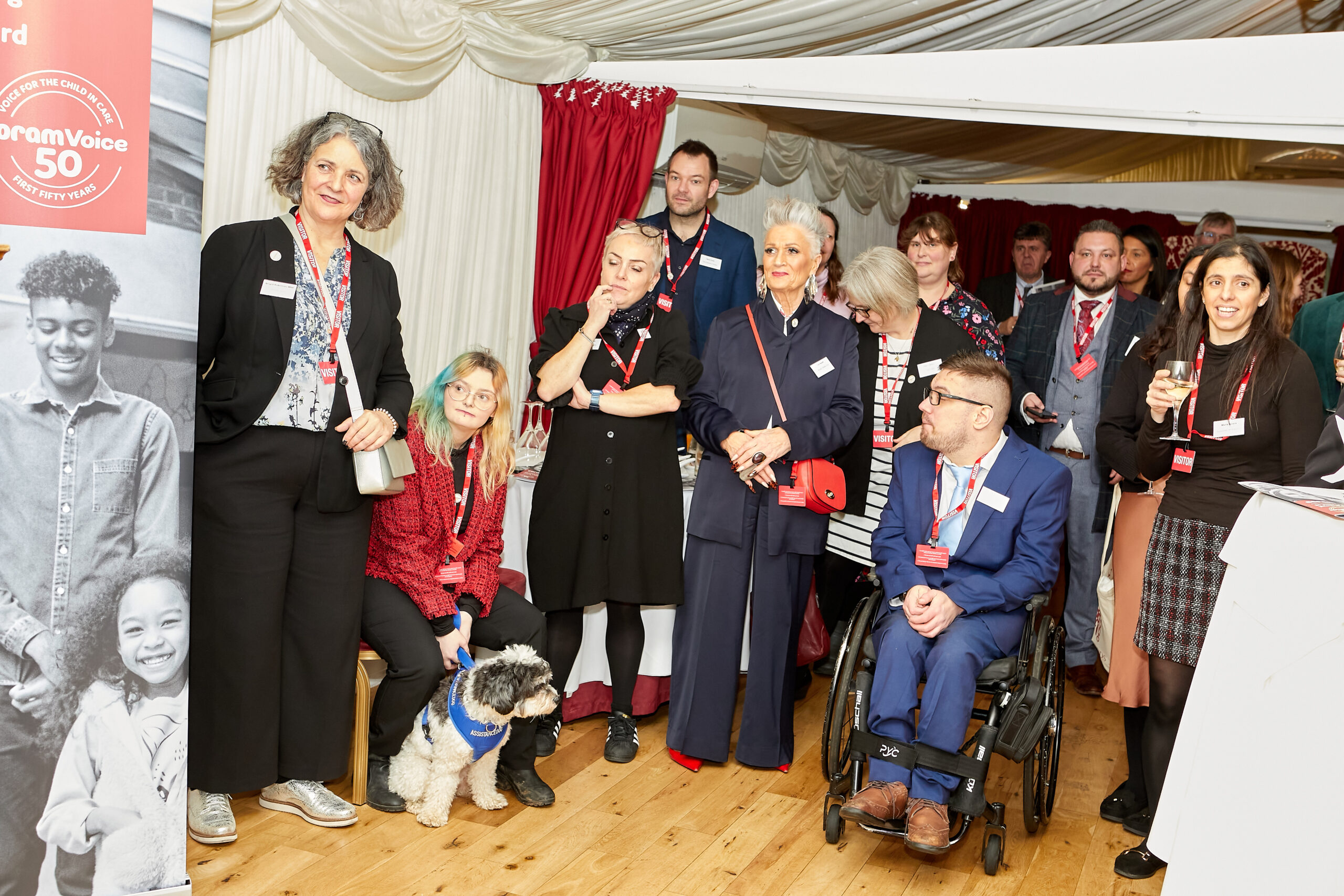We explore how care has changed and evolved through the years in the UK, and the development of the Foundling Hospital, now known as Coram.
While the laws and acts mentioned in the early timeline mainly apply to the UK from the 20th century onwards many laws referred to include only England and Wales, or England.
We recommend referring to the primary legislation and subsequent amendments for more detail.
Do you have a missing piece of the story of care? Get in touch so we can add it to our timeline.
Coram licenses the text of this timeline under Creative Commons Attribution-NonCommercial 4.0 (CC BY-NC)
1668
December 3, 1668 9:49 am
Birth of Thomas Coram
Thomas Coram is born in Lyme Regis, Dorset. Although his birth records are not located, it is thought to be 1668. His mother dies three years later.
1679
December 23, 1679 9:18 am
Thomas Coram is sent to sea
Thomas Coram's father, believed to have been a master mariner, sends him to sea at the age of 11. He is later apprenticed to a shipwright.
1694
December 23, 1694 9:20 am
1700
December 23, 1700 9:21 am
Thomas Coram marries Eunice Waite
Letters show that Thomas and Eunice Waite, the daughter of an established Boston family, are happily married. The couple never have children.
1704
December 23, 1704 9:23 am
Thomas Coram returns to England
Thomas Coram returns to England with his wife Eunice.
1719
January 8, 1719 10:45 am
Thomas Coram sails on the Seaflower, in charge of its cargo
The ship is plundered when it runs aground on the River Elbe. This is the end of Coram’s seafaring activities and likely, his travels abroad.
1720
January 28, 1720 1:55 pm
South Sea Bubble
The South Sea Company is formed in 1711 and grants a monopoly of British trade with S. America and the Pacific Islands. The company collapses in 1720, creating financial scandal. Thomas Coram finds resistance to any further subscriptions to joint stock companies, even charitable ones.
1722
December 23, 1722 9:26 am
The campaign to create the Foundling Hospital begins
Abandoned children are left to die on the streets of London, reflecting society's views about illegitimacy and perceived immoral behaviour. Thomas Coram wants better provision for these babies, and a second chance for their mothers. He begins his 17-year campaign for a Foundling Hospital.
1729
December 23, 1729 9:28 am
‘Ladies of distinction’ sign Foundling Hospital petition
After years of campaigning for a royal charter to create a Foundling Hospital, a breakthrough comes with the 1729 ’ladies petition’ supporting the campaign signed by ladies of ‘quality and distinction’, all with links to royalty.
1732
January 28, 1732 2:54 pm
The Hat Act
This act, which Thomas Coram campaigns for, is introduced to provide support for British hatmakers. Hat makers and suppliers were able to expand their market, previously monopolised by the cross Atlantic trade.
1736
February 1, 1736 4:27 pm
Arthur Onslow gives Thomas Coram a prayer book
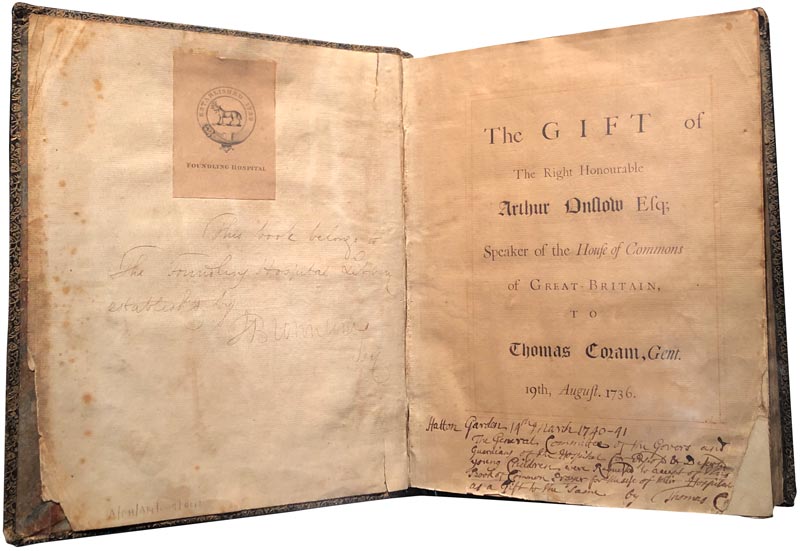
Thomas Coram donates this to the Foundling Hospital, which is now one of the most treasured items in the Hospital archives.
1739
January 11, 1739 5:15 pm
1740
January 19, 1740 1:58 pm
Foundling Hospital site found in the ‘free air’ of Coram’s Fields
It is felt children should have space and open air so they are fit for ’laborious employment’. Land is found just outside London ‘in healthy and free air’, ‘at an equal distance from the extremes of ye Town' and ‘affording excellent water’.
1740
July 8, 1740 10:47 am
Hogarth donates a portrait of Thomas Coram to the Hospital
William Hogarth’s donation inspires other artists to do the same leading to the creation of England’s first public gallery, which raised valuable funds. Hogarth also later served as a Governor and supervised an early form of foster care with his wife, Jane.
1741
April 3, 1741 10:06 am
First children admitted to the Foundling Hospital
On 25 March 1741, the first children enter the Foundling Hospital. It is in a temporary house in London's Hatton Garden with the capacity for 30 children. One of these children is John Bowles, child number five.
1741
September 18, 1741 10:23 am
Foundling children inspected before admission to the Hospital
30 children - 18 boys and 12 girls - are inspected to ensure they did not have any infectious diseases before being the first to be admitted to the Foundling Hospital. No questions were asked about their circumstances.
1742
January 18, 1742 10:28 am
Ballot system introduced for admissions to the Foundling Hospital
Each mother hoping for a place for a child draws from a ballot to see if their child can be admitted.
1742
February 27, 1742 5:43 pm
Our young ambassador Robyn’s poem about admissions to the Foundling Hospital
One of our young ambassadors, Robyn, has created a poem about admissions to the Foundling Hospital in response to the ballot system.
1742
March 20, 1742 2:01 pm
Thomas Coram is not re-elected to the General Committee of the Foundling Hospital.
Thomas Coram’s formal involvement in the Foundling Hospital ends in 1742, when he is not re-elected to the General Committee. He is said to have publicly criticised two fellow governors.
1742
December 23, 1742 9:30 am
Work begins to create the purpose built Foundling Hospital
Building begins in Bloomsbury, London. Surrounded by fields and designed by Theodore Jacobsen, it has a chapel and two wings, one for girls and one for boys.
1744
January 18, 1744 12:22 pm
First foundling inoculated against smallpox
First foundling is inoculated against smallpox. The Governors decide that all foundlings will be inoculated on their return to the Foundling Hospital, from their foster mothers in the country.
1745
September 23, 1745 9:35 am
The foundling pupils move into the Foundling Hospital
The pupils are moved out of Hatton Garden and into the first wing of the Hospital. At this point, the Chapel and the east wing have not yet been started.
1745
December 23, 1745 9:32 am
Regulations for managing the Foundling Hospital published
These regulations are read and approved at the General Committee on the 29 January 1745.
1746
January 20, 1746 11:19 am
Saturday afternoon exercise for Foundling pupils is introduced
Foundling Hospital Regulations state that on Saturday afternoons the Foundling children be ‘allowed to divert themselves with such Exercises, as will increase their Strength, Activity and Hardiness’.
1746
January 27, 1746 1:54 pm
Moses Brought to Pharaoh’s Daughter painted by Hogarth

The artist presented the piece to the Foundling Hospital upon its completion in 1746. The painting was Hogarth's only Old Testament subject. Photo credit: Coram in the care of the Foundling Museum
1747
January 18, 1747 12:14 pm
1747
July 28, 1747 2:41 pm
Portrait of Dr Mead by Allan Ramsay
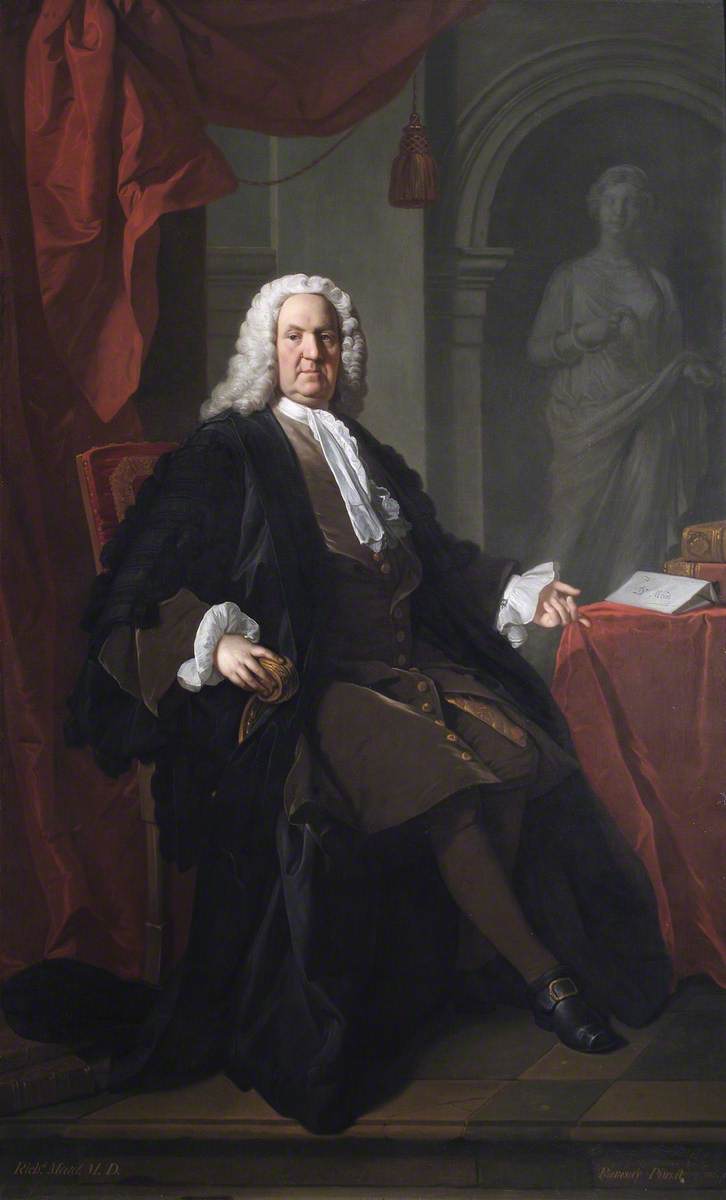
This portrait of Richard Mead, painted by Allan Ramsay, is presented to the Foundling Hospital in 1747 by the artist. Dr Mead was a patron of Ramsay, who was also friends with William Hogarth. Photo credit: Coram in the care of the Foundling Museum.
1749
May 27, 1749 9:37 am
Handel stages a fundraising concert for the Foundling Hospital
Having heard about Thomas Coram’s efforts, Handel stages a concert which includes the Hallelujah Chorus from Messiah, to pay for the Hospital’s Chapel on 27 May 1749. It was a huge hit.
1749
December 23, 1749 9:39 am
Henry Fielding’s ‘The History of Tom Jones: A Foundling’ is published
Often cited as one of the first ever ‘novels’, it explores the themes of identity and genealogy. With many homeless children and growing inequality, these themes were familiar to readers.
1751
March 29, 1751 9:41 am
Thomas Coram dies
At the age of 83, Thomas Coram dies on 29 March 1751. Despite no longer being part of the management of the Hospital, he was buried in the Foundling Hospital Chapel, though subsequently moved to St. Andrew’s Holborn.
1754
January 20, 1754 11:21 am
Javelins or darts are introduced for boys’ exercise at the Foundling Hospital
Records indicate that a suggestion is made for javelins or darts to be purchased for the boys at the Foundling Hospital. This aims to improve their physical health and dexterity, providing the children with skills suitable for occupations such as whaling.
1756
October 15, 1756 4:48 pm
Mercy Draper is born
Mercy Draper was taken into the Foundling Hospital, during the period known as the General Reception. She lost her eyesight and the Foundling Governors offered to provide training to her in singing, as she had a particularly good voice.
1756
October 20, 1756 11:23 am
Smallpox vaccine shows success in the Foundling Hospital
Of the 247 children vaccinated against smallpox in the Foundling Hospital, by 1756 only one had died of the disease.
1756
December 23, 1756 9:43 am
Jonas Hanway campaigns for reform
Hanway, Foundling Hospital Governor and, later, Vice-President of the Foundling Hospital, campaigns for widespread reform of the system of care for poor children across the United Kingdom.
1756
December 23, 1756 9:44 am
The period of General Reception begins
Parliament responds to the Hospital Governors' request for financial support, insisting that all children, within certain age limitations, must now be accepted. Funds are provided by Parliament and branch hospitals are opened across England.
1756
December 23, 1756 9:45 am
1757
January 20, 1757 1:53 pm
The Foundling Hospital appoints its first school master, Joseph Redpath
Both girls and boys are taught to read, but only boys are routinely taught to write. By 1760 Redpath was also teaching basic arithmetic. Redpath leaves the Hospital in the 1760s.
1760
January 8, 1760 10:51 am
Rule to allow orphans of soldiers admitted
Orphans of military fathers are the only children admitted between 1760 and 1763. Many children in such circumstances can get no help under the Poor Laws, as they are not registered in a local area or parish.
1760
January 15, 1760 10:30 am
Theodore Barrow is admitted to the Foundling Hospital
At just three weeks old, he comes to the Hospital with both his birth name and birth date: enclosed was a note describing him as ‘John Beard born January 19 1760.' One of our young ambassadors, Chris, has created a documentary around why those in...
1760
April 27, 1760 5:34 pm
Theodore’s story inspires young ambassador Chris
One of our young ambassadors, Chris, has created a documentary around why those in care are allocated numbers - The Numbers We’re Stuck With.
1760
December 23, 1760 9:47 am
End of the General Reception
Parliament ends the scheme which provides funds to allow the Foundling Hospital to accept all children brought to it. Criticisms of an infant mortality of around 70% is a significant factor in Parliament's decision that the scheme is too expensive to continue.
1762
December 3, 1762 12:08 pm
Hanway’s Act
The first of two laws known as Hanway’s Act is passed. The law says that each parish in London and Westminster must keep a register of local poor children.
1764
January 8, 1764 10:57 am
Fees for reclaiming a Foundling Pupil abolished
The Foundling Hospital abolishes the rule that anyone reclaiming a child must pay the Governors for the expenses of their care.
1765
December 23, 1765 9:49 am
Rights and responsibilities of parents defined
'Commentaries on the Laws of England' is published by William Blackstone. This important work defines the rights and responsibilities of parents towards their children.
1767
January 18, 1767 10:45 am
Children sent to the Foundling Hospital from local workhouses
The Foundling Hospital makes arrangements with the Overseers of the Poor to accept poor children from the local parishes. This measure comes about in response to concern at the shockingly high death rates among children sent to workhouses under the Poor Laws.
1767
December 23, 1767 9:50 am
Hanway’s Act
Hanway’s efforts result in a second ‘Hanway’s Act’, a law requiring parishes to remove infants from London to the care of rural nurses.
1772
November 3, 1772 12:05 pm
Blind Foundlings start music lessons
The Foundling Hospital cared for Foundlings with visible and invisible disabilities and provided additional support.
1778
September 27, 1778 3:05 pm
Admission of Ann Watson
Ethnicity was rarely noted in the Hospital records of the 18th century, but in this year, the Hospital admitted a baby girl ‘born of a Black mother’. The girl, renamed Ann Watson, was claimed by her mother in 1786.
1785
January 20, 1785 11:25 am
New sports equipment for girls and boys at the Foundling Hospital
Balls are ordered for the girls, and the boys are provided with cricket traps and kite twine, but it is more than a century before a swimming pool is provided.
1800
January 20, 1800 1:55 pm
Writing and accounting taught at the Founding Hosptial
By this time, boys and girls are both taught to write and some to do some basic accounting.
1800
August 9, 1800 11:55 am
John Brownlow baptised
John Brownlow was baptised at the Foundling Hospital on 9 August. He went on to become the Hospital Treasurer and was possibly the inspiration for Charles Dickens' character John Brownlow in Oliver Twist. Our Ambassadors, Aaron and Jake, created videos prompted by his story.
1801
January 18, 1801 10:48 am
Entry criteria at the Foundling Hospital is changed
A new criterion is that the child has to be illegitimate (born to parents who were not married to each other). Orphans of soldiers and sailors in the British Army and the Royal Navy are the exception to this rule.
1802
December 23, 1802 9:52 am
The Health and Morals of Apprentices Act
This is designed to protect children dependent on the state from exploitation. It applies to orphan apprentices in the textile industry. It restricts the working age to nine years and over and sets restrictions on working hours. However, there is no inspectorate to enforce it.
1807
December 23, 1807 9:54 am
13 foundlings petition Governors for information about their birth mothers
The Governors refuse the request for being ‘incompatible with the principles upon which the institution was originally founded’. They are referring to the fact it breaks the promise of anonymity given to birth mothers, enabling them to make a fresh start in life.
1808
January 8, 1808 11:11 am
The National Register criticises the Foundling Hospital
The newspaper publishes articles criticising the running of the Foundling Hospital and alleges that the foundlings are illegitimate children of the wealthy. The Foundling Hospital threatens legal action against the editor who publishes a full retraction.
1816
December 3, 1816 10:38 am
Parish Apprentices Act
This prevents London parishes from sending very young pauper children to work in factories hundreds of miles from their parents.
1817
December 23, 1817 9:55 am
John Brownlow, foundling, starts work as clerk in the Secretary’s Office
He later becomes Secretary to the Governors and publishes various works on the care of children.
1825
January 20, 1825 11:30 am
London squares ensure green space as London expands
The development of Mecklenburgh and Brunswick Squares in the 1820s ensured green space was maintained around the Hospital grounds, particularly when the rapid expansion of London in the 19th Century meant that the Foundling Hospital was no longer in the countryside.
1833
December 23, 1833 9:56 am
Factory Act restricts children’s employment in factories
Factory inspectors who can enforce this are appointed and other legislation is introduced to protect children from exploitation at work.
1834
December 23, 1834 9:57 am
Poor Law Amendment Act
This brings in the idea of separating the poor into ‘deserving’ and ‘undeserving’. It says that the workhouse should be harsh to discourage anyone from going there.
1835
January 28, 1835 2:05 pm
First workhouse opens
Workhouses can be traced back to the early 17th century, however it isn't until 1835 that the first purpose-built workhouse is erected as a result of the Poor Law Amendment Act of 1834. Here, people are fed and clothed, but put to work.
1835
December 23, 1835 10:00 am
First Annual Report of the Poor Law Commission
The requirement for Boards of Guardians to appoint teachers for children in workhouse schools is introduced.
1837
December 23, 1837 10:01 am
Charles Dickens raises awareness of the Foundling Hospital
Dickens moves to Doughty Street, near the Foundling Hospital, where he goes for regular walks through the grounds. While he lives there, he writes Oliver Twist, about an orphan boy. He also rents a pew in the Foundling Hospital Chapel.
1839
December 23, 1839 10:02 am
Custody of Infants Act
Introduces into law the ‘Tender Years Doctrine’ – that mothers should have custody of young children up to the age of four.
1840
December 23, 1840 10:04 am
Act for the Care and Education of Infants who may be convicted of Felony
This allows for the guardianship of felons under the age of 21 to be transferred from their fathers to third parties. Prototype ‘fit person orders’ are introduced, which are the first care orders.
1847
December 23, 1847 10:05 am
Foundling Hospital band established
Foundling Hospital pupils are encouraged to appreciate music and a successful band is established. Many go on to become musicians in prestigious army and navy bands.
1848
January 27, 1848 4:17 pm
The Battle of Trafalgar presented to Foundling Hospital

The painting was presented by Sir Frederick Perkins to the Foundling Hospital in 1848. The ships in the painting include 'Victory', 'Redoubtable', 'Temeraire', 'Santissima', 'Trinidad' and 'Royal Sovereign'. Photo credit: Coram in the care of the Foundling Museum.
1851
December 3, 1851 11:58 am
First act for protection of care leavers
'Act for the Better Protection of Persons under the Care and Control of Others as Apprentices or Servants and to enable Guardians and Overseers to Institute and Conduct Prosecutions on their Behalf' is the first legislation designed to provide some protection for care leavers.
1853
November 5, 1853 1:54 pm
Vaccine act
Vaccination of infants against smallpox is made compulsory, 109 years after it was first introduced in the Foundling Hospital.
1853
December 23, 1853 10:11 am
Charles Dickens writes ‘Received, a Blank Child’
This article, published in Household Words, outlines the history and the methods of the Foundling Hospital. One of our young ambassadors, Jules, talks about Charles Dickens and his relationship with the Foundling Hospital in this excerpt from his podcast.
1855
December 3, 1855 10:43 am
Education of Poor Children Act

Boards of Poor Law Guardians are granted powers to pay for the schooling of outdoor pauper children between four and 16 years old, although it is not mandatory to provide it.
1855
December 3, 1855 12:25 pm
1858
January 18, 1858 4:06 pm
Emma Brownlow King donates The Foundling Restored to Its Mother
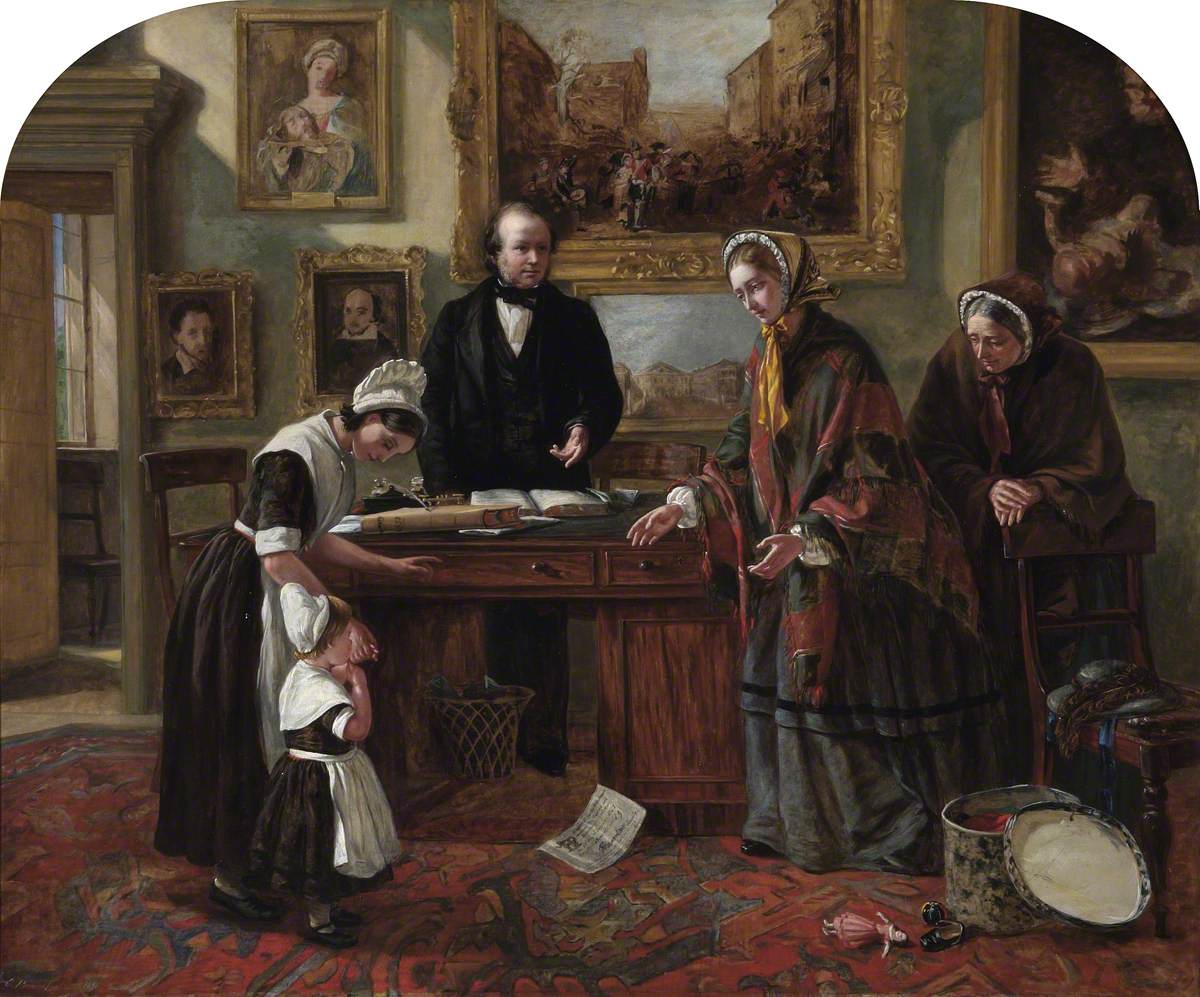
The artist, daughter of a former Foundling pupil who became Hospital Secretary, donates The Foundling Restored to Its Mother to the Foundling Hospital. Photo credit: Coram in the care of the Foundling Museum.
1863
January 18, 1863 3:32 pm
Emma Brownlow King donates The Christening
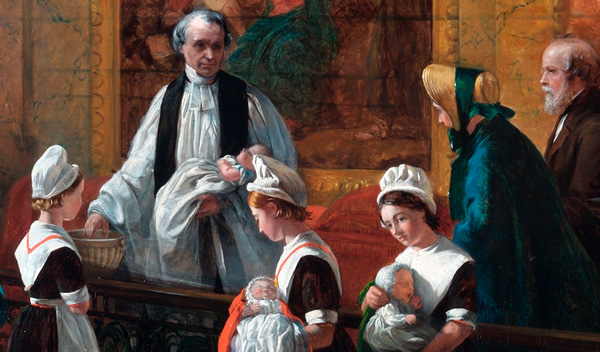
The artist donates The Christening to the Foundling Hospital. All children entering the Foundling Hospital were baptised into the Anglican church. Photo credit: Coram in the care of the Foundling Museum.
1863
April 27, 1863 5:28 pm
Mariam’s poem for Care Experienced History Month
Emma Brownlow King's painting The Christening is the inspiration for our young ambassador Mariam's poem. Watch and hear her response.
1864
January 18, 1864 4:07 pm
Emma Brownlow King donates The Sick Room
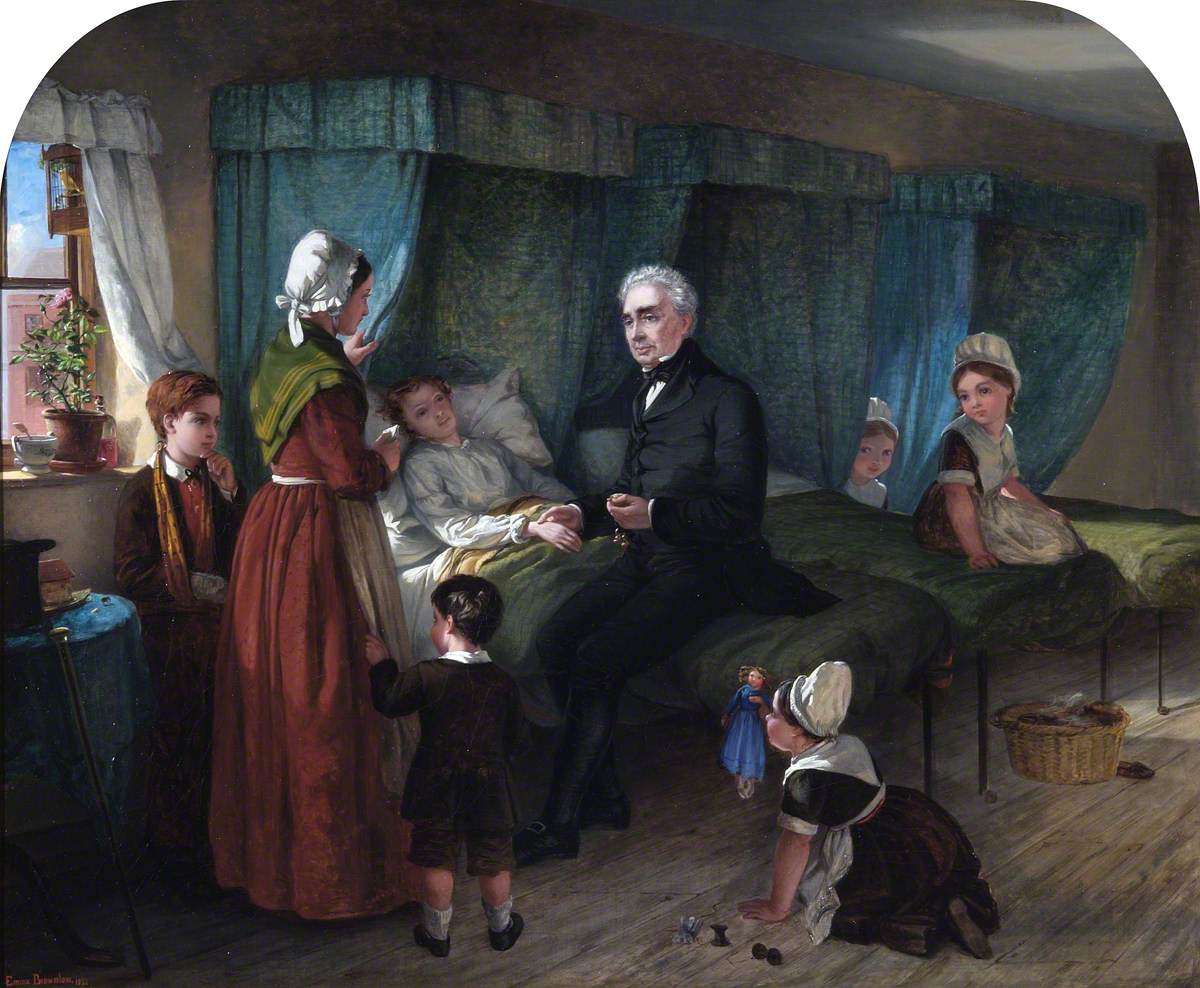
The artist donates The Sick Room to the Foundling Hospital. Child and infant deaths were common in Britain until the 20th century, and were popular themes in art and literature. Photo credit: Coram in the care of the Foundling Museum.
1867
January 18, 1867 12:25 pm
Report on the Inferiority of Workhouse Dietaries
Edward Smith releases 20th Annual Report of the Poor Law Board. His pioneering research into the diets of poor people shows the links between nutrition and health. He advised the Government and was Medical Officer to the Poor-Law Board.
1867
December 23, 1867 10:24 am
Charles Dickens and Wilkie Collins write the play ‘No Thoroughfare’
In the play, the character Walter Wilding grows up in the Foundling Hospital.
1868
January 18, 1868 12:30 pm
‘Children of the State: the Training of Juvenile Paupers’ published
Florence Davenport Hill publishes this influential text. Hill argues that workhouses create dependency and are the worst option for pauper children. Her book gives examples of successful alternatives, especially fostering, and for education and training outside the workhouse.
1868
January 18, 1868 4:09 pm
1869
January 8, 1869 11:13 am
Charity Organisations Society founded by social reformers
This aims to ensure only the deserving poor receive help, and that this help is effective. Introduces emphasis on case work, home visits, and on supporting the family – ideas which become part of the foundation of the social work profession.
1870
January 18, 1870 12:35 pm
Order of the Poor Law Board concerning the Boarding Out of Pauper Children
This is the first national scheme for fostering children, although similar local arrangements have already been introduced, including at the Foundling Hospital. It offers better care, but at the same cost, as keeping children in workhouses.
1870
February 19, 1870 12:27 pm
Married Women’s Property Act
This act allowed for married women to keep their own wages and investments. In 1882 it is amended to give women fuller financial independence, making both parents legally liable for maintaining their children. Married women living apart from their husbands can now support their children.
1870
May 6, 1870 4:23 pm
Boarding out
Introduction of the first national scheme for fostering children, called ‘boarding out’.
1870
December 23, 1870 10:25 am
Elementary Education Act
This introduces arrangements for the elementary education of all children.
1871
December 23, 1871 10:26 am
Select Committee on the Protection of Infant Life
It looks at children looked after by ‘baby farmers’. Baby farmers informally adopt children who cannot be looked after by their mothers, who pay for the service and hand over their baby. The practice is unregulated and many children are badly treated, or murdered.
1872
December 23, 1872 10:32 am
Infant Life Protection Act
Requirement for licensing and registration of private foster carers is introduced.
1874
December 23, 1874 10:33 am
‘The Effect on Girls of the System of Education in Pauper Schools: Report to the Local Government Board’ published
Jane Nassau Senior’s influential report provides evidence of poor outcomes for girls who left pauper care. It recommended that they should be able to access after care support, including accommodation when they are out of work.
1875
February 19, 1875 4:42 pm
Metropolitan Association for Befriending Young Servants established
The association supports and monitors girls who have left institutional care, helping them to find accommodation, and work as domestic servants in order to avoid 'prostitution and alcoholism'.
1878
December 23, 1878 10:34 am
Robert Grey elected a Governor of the Foundling Hospital
Grey also served as Treasurer from 1892 to 1914. Grey valued swimming as a recreational activity and was responsible for organising annual trips to the seaside and for commissioning a swimming pool – and an infirmary and mortuary – for the foundling children.
1880
December 3, 1880 10:39 am
Education Act
Compulsory schooling for all children aged five to ten introduced.
1884
February 1, 1884 5:15 pm
NSPCC founded
Businessman Thomas Agnew sets up the Liverpool Society for the Prevention of Cruelty to Children in 1883. Other towns follow and Reverend Benjamin Waugh founds the London Society for the Prevention of Cruelty to Children in 1884, which becomes the NSPCC in 1889.
1885
February 19, 1885 12:21 pm
Criminal Law Amendment Act
This Act was a result of campaigning by child protection and advocacy groups who argued that laws against sexual exploitation should protect all women and girls, not just a minority. It also outlawed homosexuality.
1888
January 18, 1888 2:58 pm
Schoolchildren’s health investigations begin
Five investigations into the physical condition of schoolchildren in London reveal stunted growth, ‘weakly bodies’ and chronic malnutrition. At this time, food is a major expense for poor families. Food poverty in children leads to a diet with little nutritional value.
1889
January 8, 1889 11:14 am
Prevention of Cruelty to and Protection of Children Act
This makes it possible to separate children from abusive parents. It introduces Fit Person Orders (early Care Orders) and Place of Safety Orders (early Emergency Protection Orders).
1889
December 23, 1889 10:36 am
Poor Law Amendment Act
This enables Poor Law Guardians to assume parental rights over orphaned and deserted children.
1890
February 19, 1890 12:51 pm
Select Committee on Infant Life Protection Bill
The Bill attempts to introduce laws for adoption and fostering, outlawing the practice of ‘baby farming’. It was a response to the 1889 case of Jessie King, hanged for murdering babies she had adopted for money.
1891
January 8, 1891 11:23 am
Industrial Schools Act
This makes it possible for the Poor Law Guardians to send children for emigration or to join the armed forces without the consent of their birth parents.
1906
January 18, 1906 3:02 pm
Education (Provision of Meals) Act
Local education authorities receive permissive powers to feed children at school. Research shows increasing evidence of the permanent effects of poor diet in children: hungry children have difficulties concentrating at school and this leads to poor health in adult life.
1909
December 23, 1909 10:37 am
Royal Commission on the Poor Laws
Extensive evidence of poor health and development of children in poor law institutions and on outdoor relief.
1911
May 6, 1911 4:38 pm
Reforms mean more children can be fostered
Until this point, children could be fostered only if they meet all of this criteria: abandoned or orphaned; aged between 2-10 years; healthy, and; well-behaved.
1913
January 8, 1913 11:24 am
Mental Deficiency Act
This means that 'Moral imbeciles' (women in receipt of poor relief at time of giving birth to an illegitimate child) can be incarcerated.
1913
December 3, 1913 12:27 pm
Pygmalion first presented on stage
George Bernard Shaw’s famous play about Eliza Doolittle, a flower girl trained in elocution and etiquette, appears to have been inspired by the story of Sabrina Sidney, who was sent to the Foundling Hospital at the age of two.
1914
January 13, 1914 2:16 pm
First World War begins
During the First World War, many former Foundling Pupils fought and died for their country.
1915
January 8, 1915 11:25 am
Notification of Births Extension Act
This gives local authorities the power to make provision for the care of expectant mothers, nursing mothers, and young children.
1918
January 8, 1918 11:26 am
Education Act
This introduces better employment conditions for teachers in state schools. By this point, education at the Foundling Hospital became increasingly out of step with education in the community.
1918
February 1, 1918 5:20 pm
International flu pandemic
February 1918 to April 1920 sees the spread of one of the deadliest pandemics in history, infecting about a third of the world’s population. This causes bereavement on a huge scale and many hundreds of thousands of children were orphaned.
1918
February 19, 1918 12:56 pm
Maternity and Child Welfare Act
This gives local authorities the power to set up ante-natal clinics. For the first time, local services are routinely available to support the health and wellbeing of all pregnant and nursing mothers, and children under five, to reduce deaths and disease in infants.
1921
January 12, 1921 2:36 pm
Chaplin’s The Kid released
This was Chaplin's first full-length film as a director, and it was a huge success.
1921
January 27, 1921 4:41 pm
First women appointed as Governors
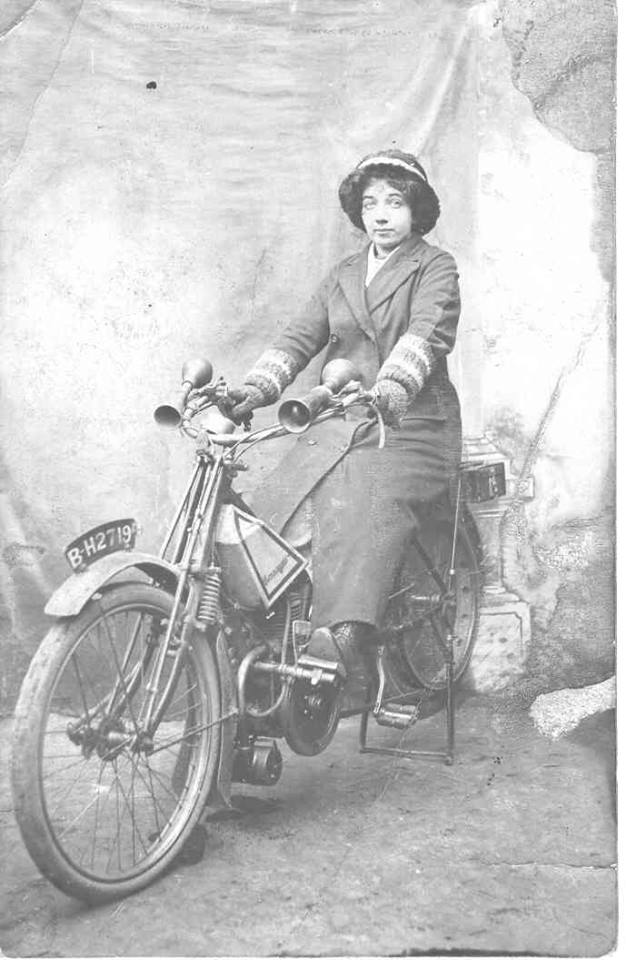
Miss Eleanor Barnes (pictured) and Lady Evelyn Waechter, are elected the first women governors of the Foundling Hospital on 12 January 1921. The two appointments may have been connected, as the husbands of both women were in shipbuilding and shipping.
1922
January 20, 1922 10:08 am
1924
January 8, 1924 11:28 am
Geneva Declaration on the Rights of the Child
Adopted by the League of Nations, this is the first international document to recognise that children have rights.
1926
January 8, 1926 11:29 am
Adoption of Children Act
Provides a legal framework for adoption in England and Wales. The provisions are similar to those of the Foundling Hospital, with the same expectations of secrecy about the child’s origins, and a complete and permanent loss of contact between infant and birth family.
1926
December 3, 1926 11:39 am
Legitimacy Act
This act means that children whose parents subsequently married after they were born could become legitimate.
1926
December 23, 1926 10:39 am
Foundling Hospital reconstruction
The Foundling Hospital's Committee Room, Court Room, Picture Gallery and staircase are reconstructed in the charity’s London headquarters. This includes original plasterwork, fireplaces, furniture and clocks, made for and donated to the Hospital by leading craftsmen of the day.
1928
October 23, 1928 3:32 pm
The original Foundling Hospital buildings in London are demolished
1935
January 20, 1935 11:44 am
Health, sport and play integral to new Foundling Hospital in Berkhamsted
The commitment to health, sport, and play informs the design for the new Foundling Hospital in Berkhamsted, now known as Ashlyns School.
1935
January 29, 1935 10:50 am
Foundling Hospital School opens in Berkhamsted
Financial difficulties led to the sale of the Foundling Hospital Estate in 1926. After a few years in Redhill, Surrey, the children moved into a new building near Berkhamsted in Hertfordshire.
1936
January 18, 1936 3:10 pm
Modernising the Foundling Hospital
The 1936 Foundling Hospital Act broadens the aims of the charity, to include education and child welfare. The charity opens an infant welfare centre, day nursery and nursery school on part of the original London site.
1936
December 23, 1936 10:43 am
Royal visit
In 1936, the Duchess of York (Queen Elizabeth, the Queen Mother) attended the Foundling Hospital Day Nursery and Toddlers Play Centre.
1936
December 23, 1936 10:44 am
New services open at Foundling Hospital
New services are established on the original London site. Coram’s Fields opens as a playground.
1939
January 13, 1939 2:14 pm
Second World War begins
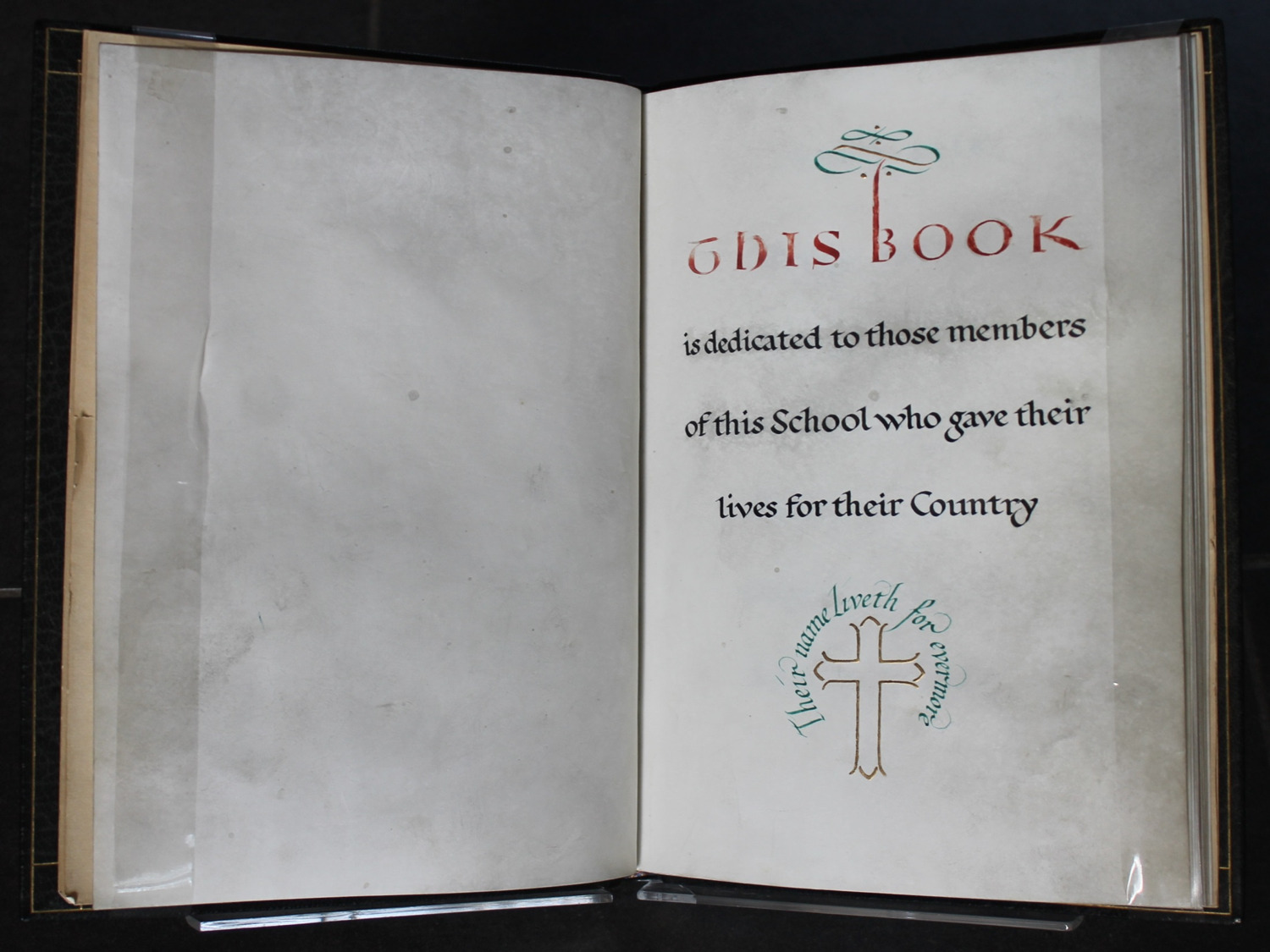
Many former Foundling pupils tragically lose their lives fighting in WW2. A difficult time for the Hospital as teachers are called up to the military, income reduces & annual summer camp, a welcome break from school life, stops. Former pupils later describe a harsh regime.
1939
January 18, 1939 3:13 pm
Effects of separation during World War Two
The outbreak of WW2 means millions of children living in cities under threat from air raids are evacuated, away from their families. This leads to enduring psychological damage, especially in young children separated from their mothers.
1944
December 23, 1944 10:47 am
Education Act
This includes compulsory education for all children from 5-15 years; establishment of primary and secondary schools; three pathways for secondary education: grammar schools, secondary technical schools and secondary modern schools. Fees for state secondary schools are abolished.
1945
December 3, 1945 11:04 am
Foster family visits
The Foundling Hospital allows visits to foster families at Easter and subsequently regularly during school holidays.
1946
February 1, 1946 5:19 pm
UNICEF founded
UNICEF, an agency responsible for providing humanitarian and developmental aid to children worldwide, is formed in December 1946. Its initial role is to provide support and supplies to children after World War II. It was originally known as the United Nations International Children’s Emergency Fund.
1946
February 19, 1946 1:00 pm
Report of Care of Children Committee (Curtis Committee)
The Curtis Report recommends an end to institutional care and practices which mark children in care as different to other children. It leads to major changes for the Foundling Hospital children.
1947
January 8, 1947 11:30 am
The Old Coram Association set up
This provides an opportunity for former Foundling Hospital pupils to keep in touch with each other and this continues today, generously supporting the work of Coram.
1948
January 8, 1948 11:31 am
Children Act (Response to Curtis Committee)
New laws aimed at placing children in care in foster families, not in institutions. This marks the end of institutional care in the Foundling Hospital. The charity begins major change to fostering and adoption services.
1951
January 18, 1951 3:14 pm
New thinking in relationships between mothers and young children
John Bowlby’s report ‘Maternal Care and Mental Health’ identifies the significance of secure and insecure attachment between young children and their main caregiver. He looks at the impact of separation between mothers and children. This becomes hugely influential on care practices and social work.
1953
December 3, 1953 11:42 am
Foundling Hospital Act
The Foundling Hospital birth certificate is replaced with one which does not identify children as foundlings.
1954
January 18, 1954 3:18 pm
The End of the Foundling Hospital School
The Foundling Hospital reviews its care system & by 1955 the residential school children are reunited with birth mothers or placed with foster families. Though the Berkhamsted school is sold (today known as Ashlyns School), the Hospital's charitable work continues from it's original London site.
1954
January 29, 1954 4:27 pm
The Foundling Hospital is re-named the Thomas Coram Foundation for Children
With a new Childcare Director, the charity becomes a pioneer in fostering and adoption work. It develops its work as a fostering agency, the only one of its kind.
1955
May 7, 1955 11:55 am
New laws reform ‘Boarding Out Regulations’
This changes and broadens the criteria defining a suitable home, for the first time since the national scheme was introduced in 1870.
1963
December 23, 1963 10:48 am
Children and Young Person’s Act
Places a duty on local authorities to offer advice, guidance and assistance, including assistance in kind or cash, to diminish the need to receive children into or keep them in care.
1968
December 23, 1968 10:49 am
Oliver! released
Oliver! The film based on Charles Dickens’s book is released.
1971
January 28, 1971 2:28 pm
Coram establishes its voluntary adoption agency
Coram begins finding families for children in care.
1973
December 23, 1973 10:50 am
Volunteer Reading Help founded
Susan Belgrave set up a reading scheme in North Kensington, which became the reading charity Beanstalk in 2012. It became Coram Beanstalk in 2019 when it joined the Coram Group.
1975
May 7, 1975 12:04 pm
Change in Birth Certificates policy
From this date, Coram gives all former pupils their birth certificates and a history of their parental backgrounds. This continues today as a key part of the work of Coram Family.
1975
December 23, 1975 10:52 am
Voice for The Child in Care founded
Social worker Gwen James met with other social workers worried that children in care where not being listened to. From this, the charity Voice for The Child in Care was born. The charity becomes part of the Coram Group in 2013.
1976
January 8, 1976 11:34 am
Adoption Act
This makes it possible for an adopted person aged 18 or above to obtain a copy of their birth certificate.
1979
January 20, 1979 2:02 pm
National Association for Young People in Care (NAYPIC) established
Following the end of the Who Cares? Project by NCB in 1978, care experienced young people create their own independent organisation – the National Association of Young People in Care (NAYPIC). It is run by and for children and young people in care aged 25...
1979
December 23, 1979 10:53 am
Life Education Centres open
Life Education Centres are set up in Australia responding to the problem of drug misuse by young people. Following a visit by HRH The Prince of Wales, Life Education comes to the UK in 1986. In 2009 they join Coram and become Coram Life Education.
1980
December 23, 1980 10:56 am
British Agencies for Adoption and Fostering formed
This membership organisation is founded and open to organisations and individuals concerned about adoption and fostering. CoramBAAF, founded in 2015, builds on its tremendous legacy of shaping adoption and fostering policy and practice in the UK and influencing the introduction of positive legislative changes.
1981
December 23, 1981 10:57 am
Children’s Legal Centre formed
The charity, which promotes and protects the rights of children in the UK and internationally, amalgamates with Coram in 2011 to become Coram Children’s Legal Centre (CCLC).
1982
December 23, 1982 11:06 am
House of Commons Social Services Committee Enquiry into Children in Care begins
The enquiry hears evidence about issues concerning children in care, including the experiences of BAME children in care. The enquiry lasts until 1984. The evidence gathered informs the development of the Children Act 1989.
1983
January 8, 1983 11:37 am
Health and Social Services and Social Security Adjudications Act
This prevents local authorities from terminating access to children in care without giving notice to parents, and gives parents the right to respond to a notice of termination by applying through the courts for an access order.
1986
February 19, 1986 12:12 pm
‘Lost in Care: The Problems of Maintaining Links between Children in Care and their Families’ published
This influential study documented the family contacts of children in all types of care. It examined contact across 450 cases from five child care authorities, including 30 families who were followed intensively during the two-year study.
1987
December 3, 1987 11:56 am
Family Reform Act
This removes all remaining legal distinctions between children born to married and unmarried parents.
1989
January 20, 1989 2:03 pm
The Children Act
This introduces the requirement to take into account the wishes and feeling of the child when making decisions about them. This is a pivotal change in positioning looked after children as having rights.
1989
December 23, 1989 11:07 am
The United Nations Convention on the Rights of the Child (UNCRC) is signed
The UNCRC, an international human rights treaty that grants all children and young people (aged 17 and under) a comprehensive set of rights, is signed in New York City.
1990
January 13, 1990 1:42 pm
1990
January 27, 1990 1:24 pm
Dame Gillian Wagner becomes First Woman Chair of Coram

Gillian becomes the first woman Chair. She wrote 'Thomas Coram, Gent' which has been described as ‘a much-needed biography of this early pioneer of children’s charity.’ In 1995 she is created a Dame Commander of the British Empire for her services to social administration.
1994
May 7, 1994 12:06 pm
Coram HIV project
Coram develops new models of substitute family care for children who have one or both parents who have HIV/AIDS.
1998
February 1, 1998 5:11 pm
Tony Blair launches Sure Start
The Prime Minister launches this government initiative at the Coram campus. It aims to give children under four ‘the best possible start in life’ through improvement of childcare, early education, health and family support, with an emphasis on outreach and community development.
1998
May 7, 1998 12:07 pm
Fostering New Links starts
Coram sets up Fostering New Links, providing home-based therapeutic care for young people 11-16 who might otherwise be placed in secure accommodation.
1998
May 27, 1998 1:27 pm
First Handel Birthday Concert
The first of the modern Handel Birthday concerts takes place at Mansion House in 1998 with a performance of Messiah by Neville Marriner and Gerald Finley. The concert takes place annually.
1998
December 23, 1998 11:08 am
Quality Protects policy initiative begins
This aims to improve outcomes for children and young people in need, and in particular, those looked after by local authorities. One of its key aims is to reduce placement instability for looked after children. The initiative continues until 2003.
1999
May 7, 1999 12:10 pm
Concurrent planning service launched
This finds foster parents who may go on to adopt a child thought to be at risk from birth. It builds on a scheme developed by Coram in the 1960s, aimed at speeding up the process of decision-making for very young children in care.
2000
January 20, 2000 2:08 pm
Climbie Enquiry
The death of Victoria Climbie leads to major reform in child protection. The 2004 Children’s Act establishes new services and frameworks for coordinating services across social work, education, health, and police.
2000
December 3, 2000 10:28 am
2000
December 23, 2000 11:09 am
Children (Leaving Care) Act
This was the first statutory framework for care leavers. Prior to this there was no nationally-set expectation about what was an adequate level of support, and many care leavers received only minimal assistance.
2000
December 23, 2000 11:12 am
Coram Boy published
This award-winning novel by Jamila Gavin is published. Set in 18th century England, it is inspired by the experiences of children at The Foundling Hospital. The novel is adapted for the stage in 2005 and adapted for radio in 2013.
2002
January 8, 2002 11:42 am
Adoption and Children Act
This removes existing orders for contact, made under the Children Act 1989, once a child is placed for adoption or an adoption order is made.
2002
January 15, 2002 11:03 am
National Care Leavers’ Week established
Founded by the Care Leavers' Foundation, this brings together major charities and interest groups working with care leavers.
2003
January 8, 2003 11:43 am
Every Child Matters policy initiative begins
This initiative, which continues until 2010, aims to support young people in five key areas: being healthy; staying safe; enjoying and achieving; making a positive contribution and achieving economic wellbeing.
2004
January 28, 2004 2:13 pm
Thomas Coram Gent. published
Thomas Coram, Gent. Is the most detailed account of Coram's life ever published. Author Gillian Wagner, who was also served as the first women Governor of Coram, searched through thousands of documents and even travelled to the United States to write this biography.
2004
December 23, 2004 11:13 am
The Children Act
The Children’s Commissioner role is established to promote the rights, views and interests of children in policies or decisions affecting their lives. It also lays a duty on local authorities to promote the educational achievement of looked after children.
2004
December 23, 2004 11:13 am
The Foundling Museum opens
The museum is established to display Coram's collection of art.
2006
January 27, 2006 1:40 pm
‘Thomas Coram – The man who saved the children’ published
Publication of the first children’s book about Thomas Coram by Harriet Amos, Alice Mayers, with illustrations by James Alistair Cochrane.
2007
January 8, 2007 11:44 am
Care Matters: Time for Change White Paper
This outlines the responsibilities of the State for children in care, including that it should be no less than each parent would have for their own child.
2008
January 28, 2008 1:07 pm
The Foundling Fellowships at the Foundling Museum are established
This biennial scheme is designed to celebrate the power of art to transform young lives. Every two years, three people are invited to be Fellows and undertake a project that speaks to the relationships between philanthropy, creativity and young people.
2008
December 23, 2008 11:15 am
Children and Young Persons Act
This requires local authorities to provide assistance to care leavers in education (including a £2000 bursary for those in higher education); and extend support from a Personal Adviser to age 21 for all care leavers; and to 25 if they remained in education.
2009
December 23, 2009 11:16 am
HM The Queen visits Coram
HM The Queen Elizabeth II visits Coram to celebrate the 250th anniversary of the death of Handel and his work with Coram.
2009
December 23, 2009 11:16 am
Coram Group forms
The Coram Group begins with the amalgamation of health, education and wellbeing charity Life Education.
2010
December 23, 2010 11:17 am
Hetty Feather published
Hetty Feather by Jacqueline Wilson is published. It is a best-selling children’s story of a spirited little girl in Victorian England, inspired the Foundling Hospital.
2010
December 23, 2010 11:18 am
Coram selected as mayoral charity
Alderman Michael Bear, Coram Governor, becomes Lord Mayor of London, selecting Coram as his mayoral charity. Coram is also the selected charity in 2011.
2011
January 19, 2011 1:56 pm
City of London’s first rock concert
Bryan Adams headlines the City of London's first rock concert, City Rocks, for the Lord Mayor's Appeal. Held at the Guildhall it was the first major event for Lord Mayor Michael Bear's 'Bear Necessities' Appeal 2011 of which Coram was a major beneficiary charity.
2011
December 23, 2011 11:18 am
HRH The Duke of Gloucester visits Coram
This visit marks the formation of Coram Children’s Legal Centre.
2013
January 15, 2013 11:14 am
Care Leaver Strategy introduced
This is the first cross-government care leaver strategy. It recognises the need to work coherently across government to address care leavers’ needs in the round; and introduces a number of changes to policies and practices so that care leavers are better supported.
2013
February 1, 2013 5:13 pm
Chief Social Worker for Children and Families position created
Isabelle Trowler takes up the post as the government’s first Chief Social Worker for Children and Families for England in September 2013.
2013
December 23, 2013 11:20 am
The Family and Childcare Trust formed
The Trust produces research on the early years and family services, including the annual Childcare Survey, and is a merger of the Daycare Trust and the Family and Parenting Institute. It later becomes Coram Family and Childcare (CFC) in 2018.
2014
December 23, 2014 11:23 am
City Rocks performance
Bryan May, Sophie Ellis-Bextor and Lily Allen are among artists who perform in Coram's biggest ever fundraising concert held at The Royal Albert Hall to mark Coram's 275th anniversary.
2014
December 23, 2014 11:24 am
Children and Families Act
This requires local authorities to support young people to remain with their former foster carers to age 21 where both the young person and carer want the arrangement to continue. This gives them continuity in their care arrangements and a more gradual transition to adulthood.
2015
December 23, 2015 11:25 am
Prime Minister visits Coram
The Prime Minister, David Cameron, and Minister of State visit Coram to announce changes inspired by Coram’s work in concurrent planning.
2015
December 23, 2015 11:26 am
Bright Spots programme begins
Coram Voice launch a five-year programme on measurement of subjective wellbeing of children in care.
2015
December 23, 2015 11:28 am
Hetty Feather television series begins
This show, which is based on the Jacqueline Wilson book, and inspired by the Foundling Hospital, airs on the BBC.
2016
January 12, 2016 2:38 pm
Spatchcocked! performed at Coram celebration
The play, written by Bruce McKay, is about Henry Fielding and William Hogarth's support of The Foundling Hospital. It is performed as part of Coram's 275th anniversary celebrations of the First Admission of a child to the Foundling Hospital in 1741.
2017
December 23, 2017 11:28 am
Social work in 42 objects published
Publication of this photographic book, containing items that tell the life story of social work connected to Coram's past and present.
2018
January 12, 2018 2:42 pm
2018
January 12, 2018 2:52 pm
Pericles performed at National Theatre
Young people from Coram are part of Public Acts, a huge company of all ages from across London who worked with professional artists to breathe new life into this classic tale in a musical version at the National Theatre.
2018
December 23, 2018 11:29 am
350th anniversary of the birth of Thomas Coram
HM The Queen opens The Queen Elizabeth II Centre and meets 102-year-old former Foundling Hospital pupil Edward Newton.
2020
April 3, 2020 12:23 pm
Coram’s ‘Call for Change’ published
To mark the 30th anniversary of UK signatory to UN Convention on the Rights of the Child, Coram publishes the Call for Change, an action plan for children and young people.
2020
December 23, 2020 11:31 am
21st Handel Birthday Concert
This featured the Band of the Scots Guards and the story of the bandsmen.
2021
April 30, 2021 5:40 pm
2022
April 14, 2022 9:30 am
2022
May 20, 2022 4:40 pm
2022
October 15, 2022 9:32 am
Old Coram Association host final meeting at Charter Day Lunch
The Old Coram Association was formed in 1947 by a group of former pupils at the Foundling Hospital to ensure friends could keep in touch after admissions to the Foundling Hospital closed. After 75 years, the OCA held its final meeting on 15 October.
2022
October 18, 2022 9:41 am
Coram Adoption celebrate 50th anniversary
On 17 October 2022, Coram published ‘A Lifetime of Difference’ report, celebrating 50 years of Coram Adoption’s pioneering work and lifelong support to adoptive families.
2023
February 7, 2023 4:56 pm
HM The Queen Camilla visits Coram Beanstalk for 50th anniversary celebration
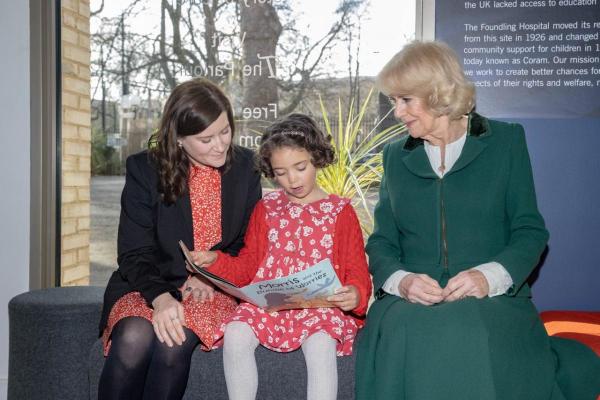
On 2 February, Coram welcomed Her Majesty The Queen Camilla (then Queen Consort) to its offices in central London for a celebration marking the 50th anniversary of its reading volunteer programme, Coram Beanstalk.
2023
April 22, 2023 4:51 pm
Shakespeare at the Foundling Hospital

22 April marks Shakespeare's birthday. To celebrate, here is a photo of former Ashlyn's pupils performing Shakespeare's 'A Midsummer Night's Dream' in 1950, which was featured in the local newspaper. Pupils include John Caldicott and Ruth Miller, now Coram governors.
2023
May 5, 2023 11:35 am
2023
June 7, 2023 2:42 pm
Volunteers’ Week 2023
We celebrated our volunteers’ commitment this June by marking a special anniversary: it’s now three years since volunteers first started working on Coram’s Voices Through Time: The Story of Care programme.
2024
August 5, 2024 11:32 am
Her Majesty The Queen becomes patron of Coram
Her Majesty The Queen becomes our Patron, building on her long association with Coram Beanstalk. It celebrates the long association of the Royal Family with Coram since the granting of the Royal Charter in 1739 and Her Majesty’s commitment to all our work.
2025


